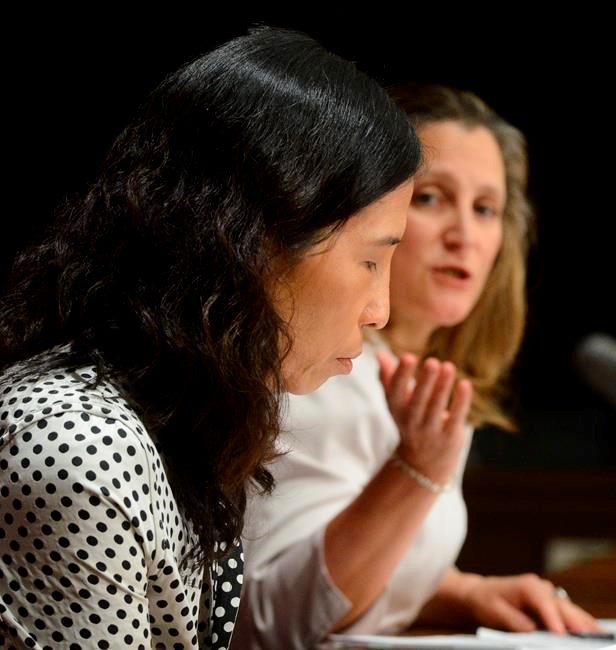OTTAWA — Municipal leaders lamented the lack of progress between Ottawa and the provinces over $14 billion in federal aid for child care, personal protective equipment and transit funding, saying the uncertainty being created would hinder efforts to safely restart local economies.
Two weeks after first pledging the money, the Liberals have yet to finalize a deal with provinces about how exactly the cash is supposed to be used.
The Federation of Canadian Municipalities warned Friday the longer it takes to land a deal, the more difficult it would be for cities to hire back laid-off workers, ramp up transit services as business restrictions ease, or reopen facilities that all require extra cleaning.
The organization asked that whatever cities get from the $14 billion federal fund, that it cover front-line services like fire, ambulance, water, transit and shelters.
Cities have said they are facing a collective budget hole of at least $10 billion from declines in transit and recreational revenues.
The longer provinces and Ottawa take to finalize funding deals, the more likely local governments will cut essential services further, or hold off on infrastructure projects that could help stimulate an economic recovery, said Edmonton Mayor Don Iveson, who heads the FCM's group of big city mayors.
"Those choices would jeopardize Canadians and, or, jeopardize our economy and undermine safe restart," Iveson said on a videoconference with reporters.
"So municipalities at this point cannot tackle this crisis alone and we're out of acceptable options."
Prime Minister Justin Trudeau and premiers talked about the money during a weekly conference call Thursday night.
The Liberals want the money to pay for increased testing and contact tracing, the purchase of personal protective equipment for workers, and cover some child-care costs over the next six to eight months.
During a visit to a gourmet cafe in Quebec on Friday, Trudeau said his government wanted to make sure every province and territory could offer the same level of protection to Canadians from public health and economic perspectives.
He suggested a holdup on the flow of money had to do with a lack of agreement that the money would be used for the exact things the Liberals want, such as providing more room or modifications for child-care centres, or cover extra expenses for cities to offer services.
"We expect the money that is allocated to go to help municipalities, which are in need right across the country, actually goes to help municipalities and be matched by investments by the provinces and territories as well," Trudeau said.
"The flexibility is on how their needs are going to be met," he added a moment later, "but we are fully expecting that the money we put forward for these things be spent on these things and that's what Canadians expect."
Trudeau said he was hopeful to have news about funding for certain areas soon, although he didn't specify when and for which provinces or territories.
Trudeau's visit to the Chelsea cafe, just north of Ottawa, was meant to underscore how the 75 per cent wage subsidy can help employers afford to rehire workers now that the economy is starting to slowly reopen after several months of pandemic-induced lockdown.
But it also came at the same time the federal government delayed the start-date for another program that was supposed to help small businesses survive the COVID-19 pandemic.
Finance Minister Bill Morneau took to Twitter late Thursday to announce that the promised expansion of the Canada Emergency Business Account to include small owner-operated businesses would not launch Friday as scheduled.
The CEBA, which provides interest-free, partially forgivable loans of up to $40,000, has been expanded twice to include more businesses.
Several weeks ago, the government announced the program was to be expanded again to include companies with payrolls of less than $20,000 and with non-deferrable expenses, like rent, utilities and property taxes, of between $40,000 and $1.5 million.
The change was intended to cover owner-operated small businesses that had been ineligible for the program due to their small payrolls, sole proprietors who receive business income directly and family-owned operations that pay family members in the form of dividends.
"Work continues around the clock to ensure the program can securely launch across over 230 financial institutions," Morneau tweeted. "We know how important the program is to small businesses & want to launch as quickly as possible."
Standing on an outdoor stone patio at Biscotti & cie Friday, Trudeau noted the owners used the program to hire back dozens of workers at the cafe and its sister operation, the Chelsea Pub.
It was the second company Trudeau has visited in as many weeks in a bid to persuade businesses to take advantage of the wage subsidy. He has been almost begging them to use it as the government tries to wean jobless Canadians off the $2,000-a-month Canada Emergency Response Benefit and transition back to work.
The $45-billion wage subsidy, originally budgeted at $73 billion, has had far less take-up than the federal government hoped. The most recent federal figures show the government has paid $13.28 billion in benefits to 223,918 different companies.
In the meantime, the government has had to almost double the original budget for the CERB to $60 billion.
This report by The Canadian Press was first published June 19, 2020.
Jordan Press and Joan Bryden, The Canadian Press



